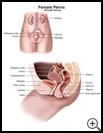
Menstruation: Missed Periods
________________________________________________________________________
KEY POINTS
- Not having periods or missing periods can mean you have not had a period at all by the time you are 15 years old or you have had regular periods and then stop having them.
- The treatment depends on the cause and may include exercising less, managing stress, taking hormones, or having surgery.
- Follow the full course of treatment prescribed by your healthcare provider. Ask your provider what symptoms or problems you should watch for and what to do if you have them.
________________________________________________________________________
What is amenorrhea?
Amenorrhea is the medical term for missed menstrual periods. Menstruation is part of the process your body goes through to get ready for the possibility of pregnancy each month. Each month, an ovary releases an egg. The egg travels through a tube called the fallopian tube into the uterus. Hormones make the lining of the uterus thicker to get ready for a baby in case the egg is fertilized by sperm. If a man's sperm does not fertilize the egg, the uterus sheds the lining it prepared for a baby. When the uterus sheds its lining, blood flows out of your vagina. This is called menstrual flow, or your period.
Normally women start having periods by the age of 15. Then, unless they are pregnant or breast-feeding, they keep having a menstrual period every month until they reach menopause, usually in their 50s.
Not having periods or missing periods can mean you have not had a period at all by the time you are 15 years old or you have had regular periods and then stop having them.
What is the cause?
If a young woman doesn’t start having menstrual periods by the age of 15, it may be caused by:
- Late puberty, which is a delay in when your body starts making the hormone estrogen. This is more common in girls who are very thin or very athletic. You need a certain amount of body fat for hormones to start the menstrual cycle.
- Problems with the thyroid gland. The thyroid gland is a small gland that makes hormones in the lower front of your neck. Too many or too few of these hormones can affect other hormones in the body, including the hormones that are part of the menstrual cycle.
- Genetic problems, such as Turner syndrome, which is a condition that affects normal female development
- Birth defects such as a vagina that does not have an opening that allows menstrual blood to escape
The reasons for missing periods after you started having them are:
- Pregnancy
- Breast-feeding
- Use of hormonal birth control (You may not have a period for 6 weeks to 6 months after you stop taking birth control pills or other types of hormonal birth control.)
- Menopause
- Extreme stress, which can affect hormone levels
- Thyroid problems
- A problem with your ovaries, which are the part of your reproductive system that produces eggs
- Ongoing, vigorous exercise, such as long-distance running
- Rapid weight gain or loss, or very low body weight
- A problem with your pituitary gland, which is located at the base of your brain and makes many different hormones.
- Some medicines
- Scarring of the uterus after some procedures
Periods also stop if you have surgery to remove your uterus (hysterectomy).
How is it diagnosed?
Your healthcare provider will ask about your symptoms and medical history and examine you, including a pelvic exam. Tests may include:
- A pregnancy test
- Blood tests
- You may have other tests or scans to check for other possible causes of your symptoms.
How is it treated?
The treatment depends on the cause. Examples of possible treatments are:
- Exercising less if you have a very strenuous exercise program
- Learning to manage stress
- Taking birth control pills or other hormone medicine to help your body have the right balance of hormones
- Having surgery
In some cases, such as menopause, you may not need treatment.
How can I take care of myself?
Follow the full course of treatment prescribed by your healthcare provider. In addition:
- If your periods are irregular, keep a record of the dates that they start, how long they last, the amount of menstrual flow, and any symptoms.
- Eat healthy foods and keep your weight steady.
- If you are overweight, a healthy diet and regular exercise will help you lose weight slowly. It’s best to lose no more than 2 pounds a week.
- If you are underweight, a dietitian can help you plan a healthy diet to gain weight.
Take care of your health. Try to get at least 7 to 9 hours of sleep each night. If you smoke, try to quit. If you want to drink alcohol, ask your healthcare provider how much is safe for you to drink. Learn ways to manage stress. Exercise according to your healthcare provider's instructions.
Ask your provider:
- How and when you will get your test results
- If there are activities you should avoid and when you can return to your normal activities
- How to take care of yourself at home
- What symptoms or problems you should watch for and what to do if you have them
Make sure you know when you should come back for a checkup. Keep all appointments for provider visits or tests.

